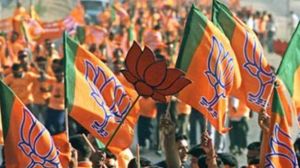Mani faces panchayats146; ire
It was India8217;s first Panchayati Raj Minister8217;s first major interaction with panchayat presidents. But what he heard was not music ...

It was India8217;s first Panchayati Raj Minister8217;s first major interaction with panchayat presidents. But what he heard was not music to Minister Mani Shankar Aiyar8217;s ears. 8216;8216;We are powerless. Give us power. Otherwise, it is pointless talking of Panchayati Raj,8217;8217; said the heads, who had gathered from across south India.
The Minister, who arrived an hour late for the interaction, placated them, saying: 8216;8216;Don8217;t despair.8217;8217;
8216;8216;I do not believe there have been no changes in the last 12 years, but only the changes have not been to the desired level,8217;8217; said Aiyar, who had played a key role in drafting the Panchayat and Nagarpalika Acts in the late 1980s.
8216;8216;Prime Minister Manmohan Singh has convened a meeting of all Chief Ministers on June 28 and 29 to discuss strategies for reducing poverty and achieving rural prosperity through panchayat institutions,8217;8217; he announced.
Aiyar said the 8216;8216;real panchayat revolution8217;8217; would take place only 8216;8216;when I have to fall at your feet to become an MP,8217;8217; he said. But, that is not what the panchayat presidents want. While MLAs and MPs do not have to face the voters everyday, for the panchayat chiefs there is no escape.
8216;8216;But what are our powers? A big zero,8217;8217;said E. Gopalakrishnan, a Dalit panchayat president from Tamil Nadu. Amid cheers from other chiefs, he said: 8216;8216;My villagers are threatening to tie me to a tree and beat me if their demands are not met. But, what do I do. There is no funds.8217;8217;
For the 10,000-odd people in his Pramadesam panchayat, there are five scavengers to clean up the village roads and drains. However, they refuse to work for a measly monthly pay of Rs 350. 8216;8216;But the villagers are asking me to wear the uniform and clean up drains. I really feel like throwing away this post,8217;8217; he said.
Panchayat presidents in Tamil Nadu have the powers to sanction works only upto Rs 491. Above that amount, the permission of the District Collector is necessary. 8216;8216;What sort of development work can I carry out,8217;8217; Gopalakrishnan asked.
The panchayat chiefs had come from different parts of south India, but their complaints were similar 8211; no power, no respect and no funds. Though not many of the panchayat chiefs knew Kannadiga, they understood what Ashoka, from Yesaragatta in Bangalore district, said. 8216;8216;The State government allotted an annual grant of Rs 5 lakh, but my panchayat is getting only Rs 1 lakh.8217;8217;
After hearing them out for nearly an hour, Aiyar said: 8216;8216;What remains to be done is devolution of functions, functionaries and finances.8217;8217; However, 8216;8216;sitting in Delhi8217;8217;, he said, he cannot decide on direct allocation of funds to a village in Tamil Nadu or Kerala.
- 01
- 02
- 03
- 04
- 05































